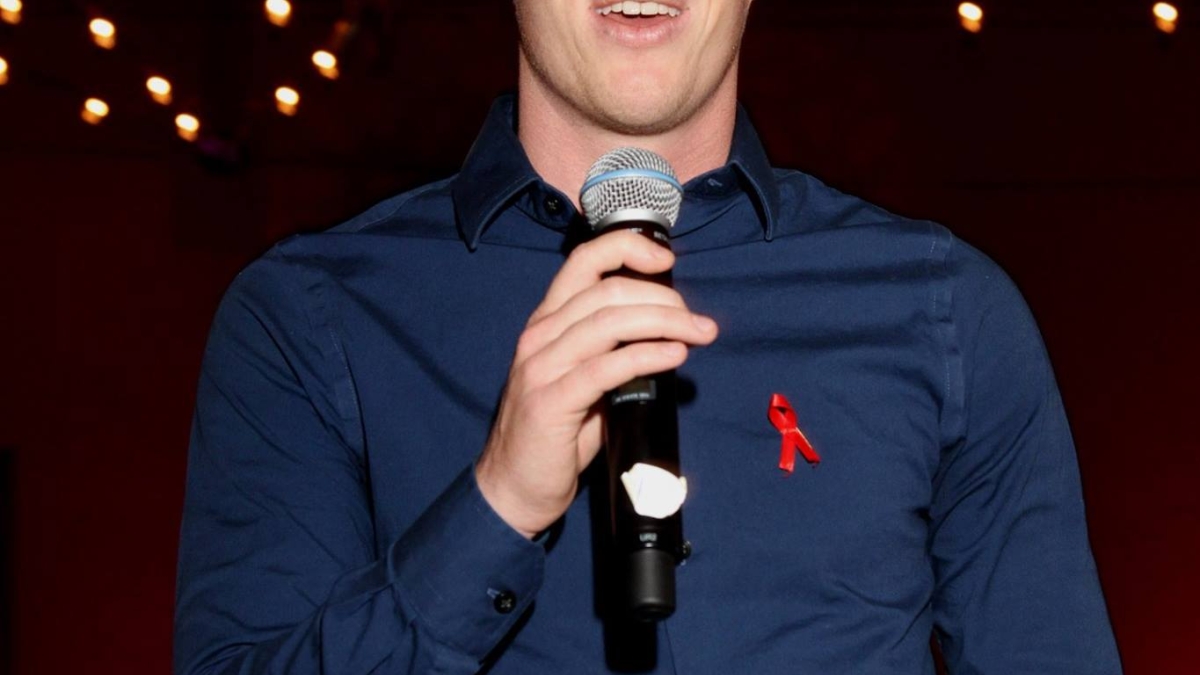ASU alum takes fight to HIV in Phoenix

Hunter Workman speaking at the 2016 IAPA fundraising gala.
There’s a new public health movement called the Fast-Track Cities Initiative that promises to improve access to testing, medication and other resources for those affected by HIV/AIDS in the Phoenix area.
It’s backed by a host of prestigious organizations, including the Joint United Nations Programme on HIV/AIDS and the International Association for Providers of AIDS Care.
Hunter Workman, an alumnus from the ASU School of Human Evolution and Social Change, helped pass the initiative in Phoenix.
Workman graduated from Arizona State University with honors in May 2016, holding concurrent degrees in global health and biochemistry. He now works for HEAL International, a nonprofit organization that provides health and empowerment education in Arizona and Tanzania.
Workman’s involvement with HIV organizations and the Fast-Track Cities Initiative began when he was a student.
He said he first learned about the HIV/AIDS epidemic when he took a class with School of Life Sciences faculty associate Damien Salamone titled “HIV/AIDS: Science/Behavior/Society.” The class had a big impact on Workman, and he recommends it to others.
“After taking the class, I developed a passion for serving people who are infected or affected by HIV by volunteering with HIV organizations in Arizona and India,” Workman said.
Time spent with other organizations, including the International Alliance for the Prevention of AIDS, took Workman all the way to India, where he helped provide AIDS education for the community of Chennai.
However, he knew there were still issues to address closer to home. According to the Arizona Department of Health Services, there were nearly 1,100 Phoenix residents who didn’t know they had HIV in 2015. Statewide, over 40 percent of people living with HIV don’t receive medical care or take medications.
Knowledge of these local issues, combined with yet another influential ASU course — “Global Health Policy,” taught by associate professor Monica Gaughan of the School of Human Evolution and Social Change — prompted Workman to combat the issue from a political angle. The course opened his eyes to the link between policy and public health.
“After working with HIV organizations for a few years, and taking that class, I recognized how getting Phoenix to commit to the FTCI would affect policy that would dramatically improve how we fight HIV/AIDS and stigma in Arizona,” he said.
“Hunter is a student who exemplifies ASU's aspirations to transform society by leveraging our place, being socially embedded and engaging globally,” Gaughan said. “He applied what he learned in the classroom about policy analysis and advocacy to a local problem.”
Workman’s first step was putting on a forum-style event with his colleague, Kohi Gill, at ASU’s Tempe campus. They called it “HIV in Your World: Local and Global Perspectives” and invited community leaders to speak or participate in the discussion. These leaders included former Tempe Mayor and former CEO of the San Francisco AIDS Foundation Neil Giuliano as well as Dr. Benjamin Young, the chief medical officer for the International Association of Providers of AIDS Care.
Young gave a presentation at the event on a new, progressive initiative by his association to end the HIV/AIDS epidemic through the participation of cities — the FTCI. During the presentation, Workman was fortuitously seated next to Giuliano.
“I asked him for his perspective on bringing the FTCI to Phoenix, and he insisted that this was the next step to ending the HIV/AIDS epidemic, eliminating HIV stigma and caring for those infected with HIV,” Workman says. “I then committed to speaking with community leaders.”
By leveraging his existing volunteer connections to HIV health organizations, and with the encouragement of Gaughan, Workman developed an honors project proposal for Phoenix to commit to the FTCI.
He presented this proposal to a group of community leaders, which led to conversations about how they could bring the initiative to Phoenix. Many of the Valley’s larger HIV organizations became involved, and they eventually formed a committee. This committee then reached out to the mayor of Phoenix, and they worked together to pass the FTCI.
“I hope to see the FTCI harmonize organizations in Phoenix to make meaningful strides, together, to reach the UNAIDS 90-90-90 goals,” Workman says. These include 90 percent of all people living with HIV knowing their status, 90 percent of all people diagnosed with HIV receiving sustained antiretroviral therapy, 90 percent of all people receiving antiretroviral therapy having viral suppression, and zero stigma surrounding HIV — all by 2021.
By providing Arizona with its greatest-ever collective effort to champion the health and rights of those affected by HIV, Workman hopes the effort will inspire other cities to also take part in the years ahead.
Over the next five years, beginning in 2017, the plan will:
- provide fast, free HIV testing and link those who test positive to medical care within 30 days
- offer people living with HIV easy access to medical care, medicine and supportive services
- empower people with HIV to maintain their treatment so that their HIV is undetectable
- renew Arizona’s commitment to HIV education, awareness and advocacy
“Overall, I am excited to see how the FTCI will bring care to all of those infected with HIV,” he said. “The FTCI will make history in Arizona and around the world.”
More Law, journalism and politics
Can elections results be counted quickly yet reliably?
Election results that are released as quickly as the public demands but are reliable enough to earn wide acceptance may not…
Spring break trip to Hawaiʻi provides insight into Indigenous law
A group of Arizona State University law students spent a week in Hawaiʻi for spring break. And while they did take in some of the…

LA journalists and officials gather to connect and salute fire coverage
Recognition of Los Angeles-area media coverage of the region’s January wildfires was the primary message as hundreds gathered at…

